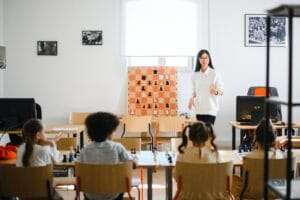The Cognitive and Emotional Benefits of Chess for Children
Chess is not just a game; it’s a powerful tool that can significantly impact a child’s cognitive and emotional development. At SPM Chess Academy, we have witnessed firsthand the transformative effects of chess on young minds. Here’s a detailed look at the numerous benefits chess offers to children.
-
Enhancing Cognitive Skills
Chess challenges the brain in unique ways, promoting the development of various cognitive skills:
– Critical Thinking: Chess requires players to evaluate different positions and make decisions based on logical reasoning. This enhances critical thinking skills that are crucial for academic success.
– Memory Improvement: Remembering moves, strategies, and the positions of pieces on the board helps improve both short-term and long-term memory.
– Problem-Solving Abilities: Chess is essentially a series of puzzles that need to be solved. Each move presents a new challenge, encouraging children to think creatively and develop problem-solving skills.
-
Boosting Academic Performance
The skills developed through chess can directly impact a child’s performance in school. Studies have shown that children who play chess regularly tend to excel in subjects like mathematics and science. The strategic thinking and analytical skills acquired from chess translate into better grades and a deeper understanding of academic concepts.
-
Building Emotional Intelligence
Chess is not just a mental exercise; it also plays a significant role in developing emotional intelligence:
– Patience and Perseverance: Chess teaches children the value of patience. They learn to wait for the right moment and to persevere even when the game gets tough.
– Handling Losses and Wins: Learning to gracefully accept both victories and defeats helps children develop resilience and sportsmanship.
– Empathy and Perspective-Taking: Understanding an opponent’s moves and anticipating their strategies fosters empathy and the ability to see situations from different perspectives.
-
Encouraging Social Skills
Chess can be a highly social activity, especially in a structured environment like SPM Chess Academy:
– Communication: Playing with peers encourages communication and the sharing of ideas.
– Teamwork: Participating in team events and group lessons fosters a sense of camaraderie and teamwork.
– Building Friendships: Chess clubs and tournaments provide a platform for children to meet and interact with others who share similar interests, leading to the development of meaningful friendships.
-
Instilling Discipline and Focus
Chess requires a high level of concentration and discipline:
– Focus: The need to concentrate on the board and anticipate future moves enhances a child’s ability to focus in other areas of life, such as studies and extracurricular activities.
– Self-Discipline: The commitment to practice regularly and the dedication to improve instill a sense of self-discipline that can benefit children throughout their lives.
-
Fostering Creativity
Chess is a game of infinite possibilities, encouraging children to think outside the box:
– Creative Problem-Solving: Finding unique solutions to challenges on the board fosters creative thinking.
– Imaginative Play: Visualizing different scenarios and outcomes promotes imagination and innovative thinking.
Conclusion
At SPM Chess Academy, we are dedicated to harnessing the full potential of chess to benefit our students’ cognitive and emotional development. We provide a nurturing environment where children can learn, grow, and thrive through the game of chess.
Enroll your child in SPM Chess Academy today and unlock the incredible benefits of chess for their growth and development!
—
About SPM Chess Academy
SPM Chess Academy is dedicated to providing high-quality chess education for children of all ages and skill levels. Our mission is to develop young minds through the strategic game of chess, fostering cognitive and emotional growth in a supportive and engaging environment.

